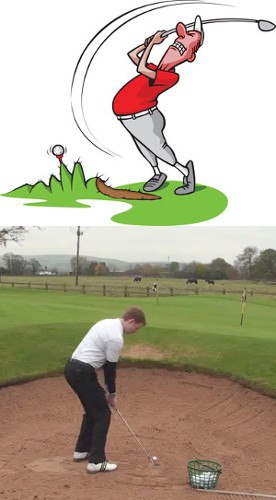
In golf we should approach different types of shots with patience, like for example bunker shots with different lies. You already know that patience is important in golf, and that certainly remains true when playing from sand instead of grass. In fact, you probably need to be even more patient when in a bunker, as there are a number of things which can go wrong if you make a rash, risky decision.
Bunkers will test your patience because you are likely to find yourself in some tough situations when you venture into the sand. Here’s how it usually plays out – you will hit your shot in a bunker, and you will be frustrated that you have missed your target. Then, once you have walked or driven up to your ball, you will see that you have drawn a bad lie in the bunker. Now, in addition to being frustrated with yourself for hitting a poor shot, you will also be annoyed at your bad luck. The combination of these two emotions may be enough to cause you to rush the bunker shot. Without thinking through your options, and without carefully evaluating the lie, you may just make a swing to get it over with. Of course, that is a bad idea, and it is likely to lead to even more trouble.
It is important that you avoid this negative spiral. It is natural to get frustrated from time to time on the golf course; this is a difficult game, after all. However, you can’t let the negativity from one shot carry over to the next. Work on learning how to let go of your frustrations as soon as possible so you can move on to the next shot. This will make you a better golfer when it comes to bunker shots, and it will also make you a better player overall.
If you lose your patience when making a decision in a bunker, you are likely to pay for it in the form of damage on your scorecard. Unfortunately, a single poor decision can lead to multiple wasted strokes in some situations. For instance, if you try a shot which is too aggressive based on your lie, and you leave the ball in the bunker, you will have already added one stroke to your score. Then, if your ball is still in a bad spot, you may not even be able to get out with the next swing. This can get out of hand quickly, and you might not have enough holes left in your round to recover.
The ability to read your lie, whether in the sand or not, is an important skill which every golfer should develop. We hope the tips provided in this article will help you make logical decisions each time you wind up in a sand trap. You will obviously hope for good lies each time you end up in a bunker, but you’re bound to run into a bad one from time to time. When that happens, make a good decision, play it safe, and keep your round on track with patience. Good luck!





